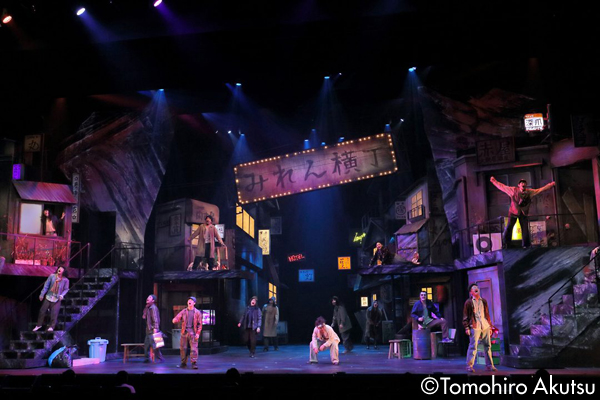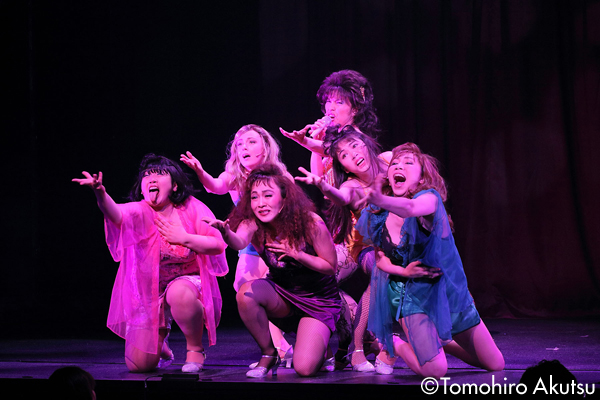

Orebushi
(May. 28 – Jun. 18, 2017 at Akasaka ACT Theater) Photo: Tomohiro Akutsu
Data
:
Premiere: 2017
Orebushi (My Ballade)

(c)西村 淳
Born in Kanagawa Prefecture, Japan in 1975, Mitsunori Fukuhara is a playwright and director. He launched the theater group Pichichi5 (quintet) (2002), the theater unit “Nippon no Kasen” (2006) where the performers operate the music and lighting themselves, and the company Bed & Makings that he co-leads with the actor Kouichiro Tomioka, which does performances outdoors and in unique places like warehouses, and while being active in these groups simultaneously he has continued to be involved in a wide range of activities. Fukuhara has won a reputation for his skill in creating worlds around characters that are simply normal people steeped in images of everyday life and develop their stories toward dramatic endings with universal scale and stages them with small numbers of actors playing multiple roles. He also does productions casting popular actors and writes many scripts for outside companies like the actress Shoko Takada’s theater unit Tsukikage Bangaichi. He was nominated as a finalist for the Kishida Drama Award for his plays Sono Yoake, Uso (2009) starring the actress Aoi Miyazaki and the play Tsunzagi Kouro, Sareru ga mama (2014) that he wrote for Tsukikage Bangaichi. And he also has won a reputation for putting new interpretations on existing works, like his successful 2016 adaptation for the stage of the popular manga Orebushi starring Shota Yasuda of the popular idol group Kan-Johnny∞ (eight). In the field of movies, Fukuhara has written numerous screenplays for films such as the television drama series Virtual Detective Tabibito Higarashi starring for Tori Matsuzaka. In 2015, he debuted as a film director with Ai wo Katareba Hentai desuka
Pichichi5
https://www.ne.jp/asahi/de/do/pichi.html


Orebushi
(May. 28 – Jun. 18, 2017 at Akasaka ACT Theater) Photo: Tomohiro Akutsu
Data
:
Premiere: 2017
Act 1
The setting is the 1990s. The young man Koji with his dream of becoming an
enka
(blues-like Japanese popular song genre) singer, leaves his home in a run-down fishing port town in the county of North Tsugaru in Aomori Province in the far north and comes to Tokyo clutching the single suit that his grandmother borrowed money to buy him. He seeks out a big figure in the
enka
world, Namihei Kitano to ask to become his apprentice, but no one shows any interest in this youth with his strong country accent and Kitano’s underlings brush him off.
Okinawa, a former Kitano apprentice who has fallen out of favor happens to be passing by at this moment and suggests to Koji that he try singing one song as an impromptu audition and get a decision that way. But, having an inherent problem of stage fright, Koji proves unable to sing well. After this failure, Okinawa takes him to a backstreet area called
Miren Yokocho
(Street of Regrets) where people like him who have lost there way in life gather, and there he is welcomed in.
A foreign woman (Teresa) who is trying to escape from her gangster (
Yakuza
) keepers shows up. Driven by his righteous desire to help the exploited woman, Koji stands up against the
Yakuza
and keeps fighting back no matter how many times he is knocked down. A desperate Koji musters up all his adrenaline-pumped strength and, forgetting himself completely, he sings an
enka
song that makes everyone stop and listen, before he faints in spent exhaustion.
In an attempt to cheer Koji up, Okinawa takes him to a strip joint named Basue Theater. Here are women working illegally [foreign women without working visas, etc.], and among them is the Ukrainian woman Teresa that the Yakuza gangsters had led away earlier. Out of a single-minded desire to rescue her from the life of forced prostitution she is bound to, Koji is determination to make money from singing in order to buy her freedom. He tries to sing the song “
Kitaguni no Haru
” (Spring in the North Country) that speaks of longing for one’s hometown, but he can’t sing it well and gets tossed out of the joint by the bouncer.
Unable to find his singing voice, Koji has begun construction labor to make a living, and in the process he has become a full-time resident of
Miren Yokocho
(Street of Regrets). An
enka
singer named Ono who performs at bars in the area happens by. He gives in to the badgering of the hard-luck residents of the street and sings them the song “
Noren
” about the comfort of drink in a small and lonely life. Ono’s singing had the power to touch the hearts of the listeners and make each one feel that the song was written just for them. To Koji, who is troubled by his inability to understand the times when he can sing and the times when he can’t, Ono says. “At times when you can’t find the words to say what you feel, when something finally makes it out of your throat, it is usually a song, isn’t it?”
Koji and Okinawa decide to become apprentices of Ono, and the two form a singer and guitar duo. Koji becomes a bar singer and trains himself to be able to sing in front of audiences. One day the singer Kitano that Koji originally tried to apprentice himself to comes into the bar where Koji is singing. After hearing Koji singing songs that cater to his audience, Kitano says to him before leaving, “If people reject your song, sing a song about yourself being rejected.” It turns out that Kitano and Ono were once considered rivals.
Meeting by chance on the street, Koji and Teresa realize that they are attracted to each other. By working together, the women at the strip joint and the residents of the Street of Regrets manage to free Teresa from her bondage to the Yakuza. When Teresa wavered for fear of the burden she would be placing on everyone, Koji sings for her in a voice that sounds as if he is struggling to get each word out. The song is “
Inochi Kurenai
” with the lyrics “Let’s be together ’til we die.”
Act 2
Teresa moves into the apartment where Koji and Okinawa live. Basking in his newfound happiness, Koji is losing his ambition to become a successful singer. A frustrated Okinawa drags him to a singing contest, but it turns out to be a fixed contest and they are quickly out of the competition. After hearing their performance, the president of a production agency Inui makes an offer, but it is only for Koji.
Not wanting to hold him back now that Koji has a chance to make a debut, Teresa decides to turn herself in to the police as an illegal immigrant, knowing that she will be forcibly repatriated.
Having split with Okinawa and losing Teresa as well, and after having shed the suit his grandmother gave him, corrected his country accent and worked hard to come this far, in the end Koji loses his chance to debut as a singer when he gets trapped in ugly machinations within the celebrity world.
As for Okinawa, he has become a Yakuza underling, and when he tries to extort money from Kitano, he ends up being locked up in a cell for confinement. Kitano has finally recognized Okinawa’s talent and tells him, “
enka
is meant for low-lifes like you,” and encourages him to write his own songs based on his own life experiences.
In no time at all, the Street of Regrets has become deserted. It is now the era of Karaoke parlors and work for bar performers is on the decline. Ono is looking for work, and Koji, who has now ended up back on the street, has lost his purpose in life and finds himself at his wits’ end. Okinawa tells Koji, “Now that you have lost your dream, your hope, your woman and your pride, you are finally a good match for me.” Then he hands Koji the score for the song “
Orebushi
” (My Blues / My Ballade) that he has written with all his heart and soul.
Motivated again by this to begin singing
enka
seriously again, Koji and Okinawa get a gig as a warm-up act at an outdoor concert, but amid the jeers of the audience that has come to the concert to hear the pop idols who will perform later, they can’t get their songs across. Just as he is losing his confidence to keep singing, Koji hears Teresa’s voice.
On this, the day when Teresa is to be forcibly repatriated to the Ukraine, the women of the Basue theater have brought her to see Koji one last time. Koji and Teresa speak of their feelings for each other once again. Then, as rain falls, she listens to Koji pour his heart into the song
Orebushi
before she quietly departs.
The next day there is no mention of Koji in the newspaper article about the concert. At the Street of Regrets, though, the residents are gathering to tell Koji and Okinawa that they heard their song and it moved their souls. There is a beam of sunlight, and from the distance Koji and Okinawa come walking toward them.
Related Tags